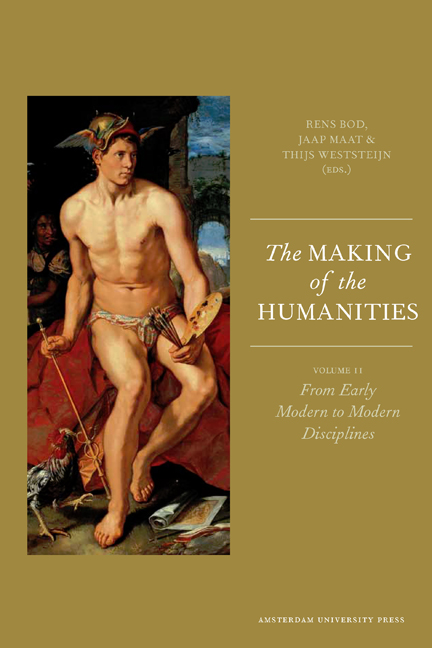Book contents
- Frontmatter
- Contents
- Introduction: The Dawn of the Modern Humanities
- I Linguistics and Philology
- II The Humanities and the Sciences
- III Writing History and Intellectual History
- IV The Impact of the East
- V Artworks and Texts
- VI Literature and Rhetoric
- VII Academic Communities
- Contributors
- List of Figures
- Index
The Role of Emotions in the Development of Artistic Theory and the System of Literary Genres
Published online by Cambridge University Press: 19 January 2021
- Frontmatter
- Contents
- Introduction: The Dawn of the Modern Humanities
- I Linguistics and Philology
- II The Humanities and the Sciences
- III Writing History and Intellectual History
- IV The Impact of the East
- V Artworks and Texts
- VI Literature and Rhetoric
- VII Academic Communities
- Contributors
- List of Figures
- Index
Summary
Closely connected to the development of the humanities is the concept of the fine arts as it developed during the eighteenth century. While the classical liberal arts, including rhetoric, had been defined pedagogically, the ‘fine’ arts were defined by their ability to give pleasure, as opposed to the ‘useful’ arts. Precisely which arts should be defined as ‘fine’ has varied, but Charles Batteux in his influential Les Beaux arts réduits à un même principe, 1746, explained that the fine arts consist of music, poetry, painting, sculpture and dance. One essential condition for the fine arts, les beaux arts, die schöne Künste, was that not only poetry and the other arts were understood and arranged in a new manner, but also the genres of poetry were defined in new ways. By focusing on the interaction between literary genre theory and theory of the arts as a whole, this paper aims to elucidate a set of negotiations of the emotions which laid the ground for the development of the fine arts and the discipline of aesthetics. The point of focus is the role attributed to emotion in poetics. The history of theories about the emotions is indeed diversified, but at the heart of the matter, in the words pathos and passio themselves, resides an anxiety concerning the lack of control, the suffering and even sinfulness of being subjected to emotions, or, rather, passions. It is a well-known fact that the rise of aesthetics in the eighteenth century comprised a new appraisal of sensual impression (aisthêsis) and sensuality. This appraisal of sensation and emotion could hardly have taken place earlier in history, since it depends partly on scientific progress not least within psychology, and partly on an apparent change of moral values connected withemotions. About that time, lyric was also appointed a major genre beside epic and drama, and lyric obviously was closely associated withemotion. The tripartite genre theory had been suggested earlier, but its breakthrough came with the theory of the fine arts.
Within the system of poetics, the development can be described as a continuous negotiation of categories. Room is made to transfer the emotions from the role of instrument and effect to the role of object of poetry.
- Type
- Chapter
- Information
- The Making of the HumanitiesVolume II: From Early Modern to Modern Disciplines, pp. 267 - 282Publisher: Amsterdam University PressPrint publication year: 2012



